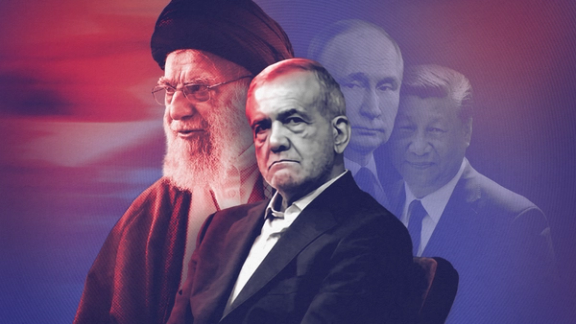‘Difficult position’ awaiting Iran's president in New York

In a reaction to Iran's delivery of ballistic missiles to Russia, Poland's Foreign Minister Radoslaw Sikorsky said this week that Iran's new President Masoud Pezeshkian has disappointed him.

In a reaction to Iran's delivery of ballistic missiles to Russia, Poland's Foreign Minister Radoslaw Sikorsky said this week that Iran's new President Masoud Pezeshkian has disappointed him.
However, Sikorsky is not the only one disappointed by the Iranian President's performance whose campaign promises inspired some hope of changes in Tehran’s policies.
Since Pezeshkian assumed office in August, Iran has executed more than 90 prisoners. As the anniversary of Mahsa Amini's death in custody approaches—a tragic event that sparked widespread protests in 2022—Pezeshkian's government has intensified its crackdown. Family members of those who were killed, blinded, or injured during the protests are now being arrested.
Others including student activists and journalists such as Hamid Asefi have also been arrested, though Asefi was released on bail later.
In the meantime, economic pressures on the nation have been mounting as the price of bread redoubled in less than one week, while millions of hard pressed poor citizens mainly rely on bread to survive.
According to commentator Abbas Abdi in Tehran, the Iranian Judiciary has been issuing travel bans for several filmmakers following the international success of Iranian underground movies at the Venice Film Festival. Abdi called the practice "harassment of citizens" and called on the government to be accountable for the violation of citizens' rights.
The biggest disappointment in Iran is about Pezeshkian's national accord or national reconciliation doctrine which ended up not to be a reconciliation between the government and nearly 60 percent of the population who refused to vote and 92 percent who are unhappy about their living conditions according to a government survey. It is instead a scheme to share a bit of political power between conservative elements such as vice president Aref in the country's reform camp.
Meanwhile, Iranian media have been accusing the United States and Europe of "psychological warfare" against Iran by stating that Tehran has sent hundreds of ballistic missiles to Russia to be used in the war against Ukraine. In an article on proreform Fararu website foreign relations analyst Ali Bigdeli opined that the accusation is aimed at putting President Pezeshkian in a difficult position when he is going to face reporters in New York soon during the annual UN General Assembly.
Iranians commenting on social media predict that Pezeshkian will face significant embarrassment during his meetings with the press and politicians in New York. This is attributed to several factors, including his perceived naivete in international politics, his untimely and politically incorrect remarks, and his failure to act on promises made over the past two months. These promises include improving internet and social media access and halting the Morality Police's violence against Iranian women.
Just before departing Tehran for a visit to Iraq, Pezeshkian was unaware that his microphones were still on when he asked Khamenei's representative, Mohsen Qomi, after delivering a brief speech: "Did I make a bad blunder?" Upon seeing the cleric smile, Pezeshkian remarked, "They’re sending me on a diplomatic mission about which I know nothing."
If Iran still intends to send Pezeshkian to New York, he may be aware that his chances of improving relations with Europe and the United States have been jeopardized by recent news of arms sales to Moscow. Additionally, it remains uncertain whether Khamenei will authorize him to engage in talks with U.S. officials. Should Khamenei grant permission, it would represent a significant shift, given that he has previously barred at least four other presidents from meeting with Americans. President Hassan Rouhani, who once took a phone call from former President Barack Obama on his way back to JFK airport, faced severe criticism from Khamenei and other hardliners.
Iran badly needs financial resources, and this could justify "heroic flexibility" in the form of exchanging a few words with a US official. Anything beyond that seems to be out of question at least for the time being.
Meanwhile, hardliners in Iran seem to be preparing for a possible change in strategy by promoting the idea of psychological warfare to place Pezeshkian in a difficult position in New York. Pezeshkian has never been comfortable discussing politics, even in Tehran. Although his speeches will be scripted in advance, controlling him during interviews will be challenging, and TV anchors are unlikely to accept superficial questions that do not address serious issues.
Hardline commentators seem to be on the brink of urging the government to cancel the New York visit altogether. Denial of a US visa to a prominent delegate, such as former Foreign Minister Javad Zarif, could provide a pretext for such a move.